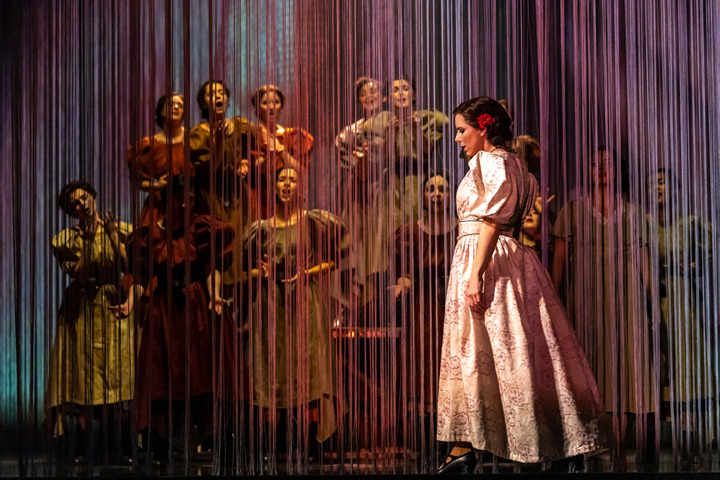| Opera Reviews | 17 May 2024 |
Scottish Opera makes a strong case for Ainadamarby Catriona Graham |
|
Golijov: Ainadamar |
|
 |
|
|
The curtain rises on a circular floor to ceiling fringe, across which projected images flicker, including a bull. On a dais in the middle of the circle, a male dancer stamps out the percussive rhythms of flamenco. There is no doubt where Scottish Opera’s collaboration with Opera Ventures Ainadamar is set; we are in Granada, Andalusia. Osvaldo Golijov’s opera with David Henry Hwang’s libretto is a story, told through memory, of the actress Margarita Xirgu, who created the role of Mariana Pineda in Federico Garcia Lorca’s play. Pineda was a nineteenth century Granadan activist garroted for conspiracy. Golijov’s score is percussive, with sensuous strings and luscious harp, punctuated by brass, at times sounding like one of these 1930s Hollywood film scores where the stars are flying down to Rio or suchlike, and, at times, quiet except for the sound of the fountain. The singing is impressive. Lauran Fagan, as Margarita, is sometimes sweet and flirtatious, then raw, or soaring with a fluid melodic line. It’s a highly dramatic role, spanning her life from a young, politically motivated actress to dying, surrounded by her students. Nuria, to whom she is passing on her knowledge and understanding of Lorca, his play and acting more generally, is sung by Julieth Lozano, a supporting role in more ways than one. Nuria is sensitive to Margarita’s passion and need to pass on her memories, but also to the older woman’s failing health. Lozano is both bright and gentle; when the storyline lets her emerge from the metaphorical shadow of Margarita, her voice rings out. Lorca is a trouser role, sung by Samantha Hankey, who catches the slightly louche manner of a young playwright, being almost lionised by an acclaimed actress. Margarita assumes the play is politically motivated; Lorca, in a beautifully sung aria, explains that he fell in love at nine years old with Mariana’s statue outside his bedroom window, and has been fascinated with her ever since. It will be his downfall. The Falangists don’t believe he can be apolitical either, and Ruiz Alonso is determined he will be executed. The flamenco singer Alfredo Tejada gives Ruiz’s frequent denouncements a distinct chill. The immense sound cuts through whatever else may be happening musically at the time. Lorca’s death, when it comes, is mythologised; a bullfighter (Dan Shelvey) on his right, a teacher (Colin Murray) on his left, all cut down by bullets by the fountain after they have made their ‘confessions’. The chorus is excellent, whether the shouts of the crowd or the adoring students of Margarita. Dressed in autumnal browns, reds and greens, when they are onstage, they are in almost constant movement. Then there are the flamenco dancers – two men and two women who place the action so firmly in Andalusia with every stamp and clap, choreographed by Antonio Najarro. Director Deborah Coker has one of the women perform along a catwalk as yet another memory from the dying Margarita’s youth; it is almost menacing in its power. The design team of Jon Bausor, Paul Keogan, Tal Rosner and Cameron Crosby have created a memorable setting for this production, and the orchestra, conducted by Stuart Stratford, evokes the sounds so expressively in their playing. |
|
Photo © James Glossop |
|







